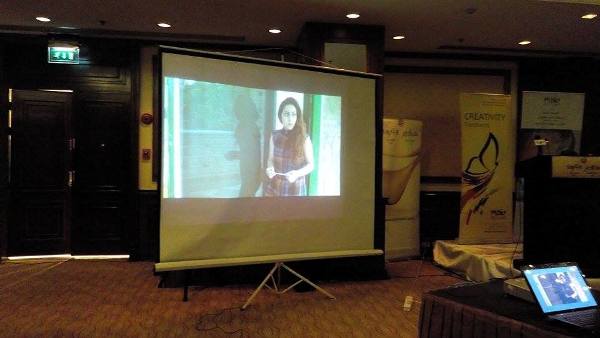Latest NEWS
- Aswat Masriya, the last word
- Roundup of Egypt's press headlines on March 15, 2017
- Roundup of Egypt's press headlines on March 14, 2017
- Former Egyptian President Hosni Mubarak to be released: lawyer
- Roundup of Egypt's press headlines on March 13, 2017
- Egypt's capital set to grow by half a million in 2017
- Egypt's wheat reserves to double with start of harvest -supply min
- Roundup of Egypt's press headlines on March 12, 2017
Combating human trafficking with creative arts

A display of "Dark White" television drama during a press conference to launch an initiative on combating human trafficking, Cairo, Wednesday, September 30, 2015 - Aswat Masriya
By Omnia Talal
A staggaring 2.4 million people worldwide, 80 percent of which are exploited as as sex slaves, are victims of human trafficking, according to statistics by the UN Office on Drugs and Crime.
This rising global issue, described as a contemporary form of slavery, is one of the most prevalent crimes in the world, ranking third after arms and drug trafficking.
Egypt's share of this global epidemic is equally staggering, with estimates in the hundreds of thousands including street children, refugees and asylum seekers falling victim to it.
The Second Chance Project, which launched on Wednesday, brings together a number Egyptian women's organisations across the country who are using creative arts to combat human trafficking of women and girls.
This new civil society alliance aims at raising awareness about the seriousness of the crime and providing psychological, physical and legal support for women at risk of being subjected to trafficking or those who have already endured it.
To that end, the alliance will produce four documentary films portraying the lives of trafficking victims.
The project's first phase began in December 2014. It included field work, in-depth discussions with stakeholders and the production of a television drama titled "Dark White" which addresses the issue. It also included the creation of a trainers' manual for working against trafficking through arts and media.
"The increasing number of refugees because of armed conflict will hike the number of those vulnerable to being trafficked," said Nehad Abul Qomsan, head of the Egyptian Center for Women's Rights.
She claims that Egypt is currently home to four million refugees who are at risk, in addition to women and children who are exploited in the sex trade, as domestic workers and street beggars.
According to statistics on the the website of the UN High Commission for Refugees in Egypt, the total population of concern as of January 2015, including refugees and asylum seekers and stateless persons, is 267,820.
Abul Qomsan said that 79 percent of victims of trafficking in Egypt are women, 70 percent of which are being exploited in the sex trade, while 14 percent perform forced labor and are subjected to kidnapping to feed the illegal trade in human organs.
"Syrian refugee women are being married off for EGP 500 in Egypt," she added.
Eighty percent of women who were sexually exploited can no longer feel their bodies, said psychiatrist Awsam Wasfy. Most of those exposed to trafficking suffer from severe psychological disorder and lack of a sense of trust in themselves and in others, he added.
Script writer Mariam Naoom noted that the real problem is that society continues to deny that these crimes happen, adding that art should push society to acknowledge these issues and address them.
Egypt prohibits all forms of human trafficking through its 2010 anti-trafficking law (Law No. 64), which prescribes penalties from three to 15 years’ imprisonment along with fines ranging from the equivalent of approximately $8,300 to $33,300.










